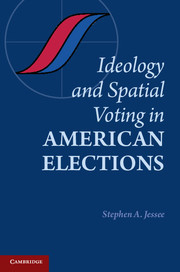Description
Ideology and Spatial Voting in American Elections
Author: Jessee Stephen A.
Testing assumptions and implications of spatial voting theory, this book connects theory with empirical analysis of voter preferences and behavior.
Language: English
Subject for Ideology and Spatial Voting in American Elections:
Approximative price 31.58 €
In Print (Delivery period: 14 days).
Add to cart
Ideology and Spatial Voting in American Elections
Publication date: 06-2012
256 p. · 15.2x22.8 cm · Paperback
Publication date: 06-2012
256 p. · 15.2x22.8 cm · Paperback
Approximative price 83.44 €
In Print (Delivery period: 14 days).
Add to cart
Ideology and spatial voting in american elections
Publication date: 06-2012
256 p. · 15.8x23.5 cm · Hardback
Publication date: 06-2012
256 p. · 15.8x23.5 cm · Hardback
Description
/li>Contents
/li>Biography
/li>
Ideology and Spatial Voting in American Elections addresses two core issues related to the foundations of democratic governance: how the political views of Americans are structured and how citizens' voting decisions relate to their ideological proximity to the candidates. Focusing on testing the assumptions and implications of spatial voting, this book connects the theory with empirical analysis of voter preferences and behavior, showing Americans cast their ballots largely in accordance with spatial voting theory. Stephen A. Jessee's research shows voters possess meaningful ideologies that structure their policy beliefs, moderated by partisanship and differing levels of political information. Jessee finds that while voters with lower levels of political information are more influenced by partisanship, independents and better informed partisans are able to form reasonably accurate perceptions of candidates' ideologies. His findings should reaffirm citizens' faith in the broad functioning of democratic elections.
1. Introduction; 2. Ideology; 3. Measuring ideology; 4. Linking theory and empirics: testing spatial voting theory; 5. Partisanship vs. proximity; 6. Political information and vote choice; 7. The political perceptions of citizens; 8. Conclusion.
Stephen A. Jessee is Assistant Professor of Government at the University of Texas, Austin, USA.
© 2024 LAVOISIER S.A.S.




